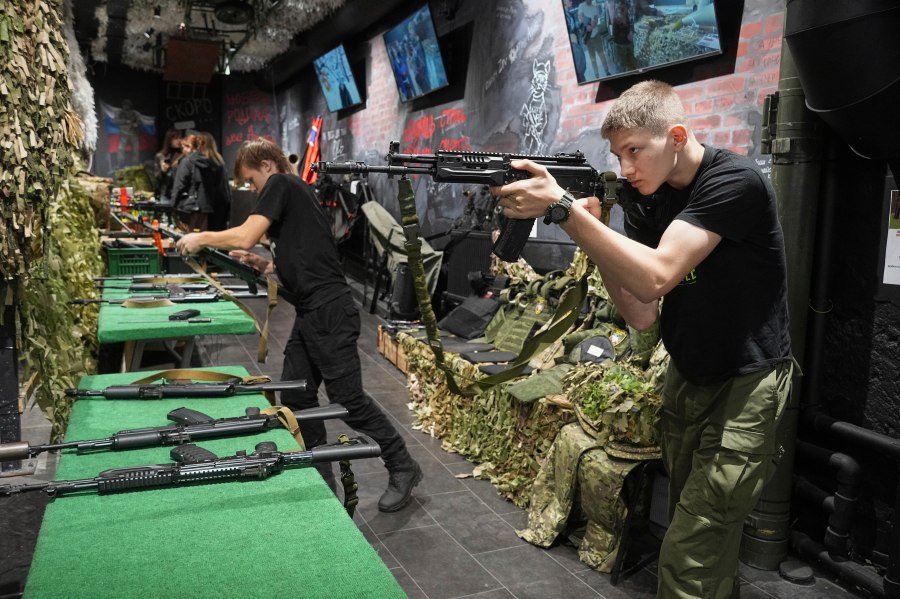World
Russian Forces Advance Into Eighth Ukrainian Region Amid Stalled Peace Efforts

Russian forces have successfully entered an eighth region of Ukraine, intensifying their ongoing military campaign as international peace efforts struggle to gain momentum. On Wednesday, Ukrainian military spokesperson Victor Trehubov confirmed that Russian troops have penetrated the villages of Novoheorhiivka and Zaporizke in the eastern Dnipropetrovsk region. This area is a significant industrial hub adjacent to the conflict-ridden Donetsk region.
Despite claims from Russia’s Defense Ministry earlier this month that its forces had secured the two villages, Trehubov reported that fighting is still ongoing and that the Russians have not established defensive positions. Ukrainian troops are facing immense pressure as they strive to hold their ground against a numerically superior Russian army. While military analysts indicate that there is currently no indication of a breakdown in Ukrainian defenses, the slow advance through rural territories continues to exert pressure on the Ukrainian forces.
The front line of this conflict extends approximately 1,000 kilometers (620 miles) across eastern and southeastern Ukraine, where both sides have suffered significant casualties. Russian forces already occupy the regions of Sumy, Kharkiv, Luhansk, Donetsk, Zaporizhzhia, Kherson, and Mykolaiv. Following Russia’s illegal annexation of the Crimean Peninsula in March 2014, Moscow now controls about one-fifth of Ukrainian territory.
As military operations escalate, Western leaders have criticized Russian President Vladimir Putin for delaying peace negotiations and not engaging sincerely in discussions. During a recent address, U.S. President Donald Trump expressed frustration over Putin’s reluctance to accept a proposal for direct peace talks with Ukrainian President Volodymyr Zelenskyy. Trump indicated that he would decide on further actions within a fortnight if these talks do not materialize.
Ukraine has shown willingness to engage in discussions regarding a summit with Putin and a potential ceasefire. Meanwhile, Russia has expressed hesitance towards Western plans for postwar security guarantees for Ukraine, which fears future aggression even if a peace agreement is reached. These guarantees may involve the deployment of European troops in Ukraine, a prospect that Kremlin spokesperson Dmitry Peskov has firmly rejected.
To counter Russia’s military actions, Ukraine is targeting the infrastructure supporting the Russian offensive. Recent strikes using long-range drones have severely impacted oil refineries and other essential facilities within Russia, leading to fuel shortages in some regions. Concurrently, Russia continues its systematic assault on Ukraine’s energy infrastructure, aiming to disrupt power supplies as winter approaches. The Energy Ministry of Ukraine reported that Russian attacks have targeted energy and gas infrastructure in six regions of the country.
As both sides navigate this complex and ongoing conflict, the humanitarian toll continues to rise, with countless lives affected by the relentless fighting. The ramifications of these military actions extend beyond the battlefield, impacting energy stability and international relations as the world closely watches the developments in Ukraine.
-

 Lifestyle5 months ago
Lifestyle5 months agoLibraries Challenge Rising E-Book Costs Amid Growing Demand
-

 Sports4 months ago
Sports4 months agoTyreek Hill Responds to Tua Tagovailoa’s Comments on Team Dynamics
-

 Sports4 months ago
Sports4 months agoLiverpool Secures Agreement to Sign Young Striker Will Wright
-

 Lifestyle4 months ago
Lifestyle4 months agoSave Your Split Tomatoes: Expert Tips for Gardeners
-

 Lifestyle4 months ago
Lifestyle4 months agoPrincess Beatrice’s Daughter Athena Joins Siblings at London Parade
-

 Science4 months ago
Science4 months agoSan Francisco Hosts Unique Contest to Identify “Performative Males”
-

 World4 months ago
World4 months agoWinter Storms Lash New South Wales with Snow, Flood Risks
-

 Science5 months ago
Science5 months agoTrump Administration Moves to Repeal Key Climate Regulation
-

 Business5 months ago
Business5 months agoSoFi Technologies Shares Slip 2% Following Insider Stock Sale
-

 Science5 months ago
Science5 months agoNew Tool Reveals Link Between Horse Coat Condition and Parasites
-

 Sports5 months ago
Sports5 months agoElon Musk Sculpture Travels From Utah to Yosemite National Park
-

 Science5 months ago
Science5 months agoNew Study Confirms Humans Transported Stonehenge Bluestones









